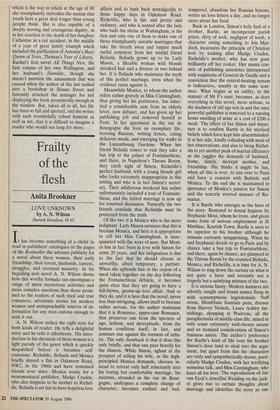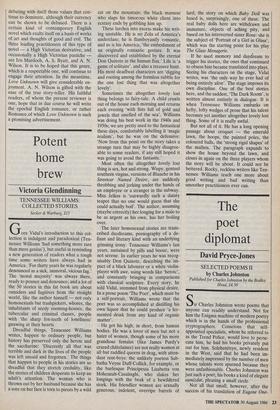Frailty of the flesh
Anita Brookner
LOVE UNKNOWN by A. N. Wilson
Hamish Hamilton, f9.95
It has become something of a clich8 to read in publishers' catalogues or the pages of the Bookseller the advance publicity for a novel about three women, their early friendship, their lovers, husbands, careers, struggles, and eventual maturity. In his beguiling new novel A. N. Wilson shows how this worthy formula can encompass a range of more mysterious activities and more complex emotions than those prom- ised to the readers of such tried and true romances, adventure stories for modern women and unimpeachable sources of in- formation for any men curious enough to seek it out.
A. N. Wilson strikes the right note for both kinds of reader. He tells a delightful story and he tells it effortlessly. His intro- duction to his chronicle of three women is a light parody of the genre which is quickly despatched before it becomes self- conscious. Richeldis, Belinda and Monica briefly shared a flat in Oakmoor Road, NW2, in the 1960s and have remained friends ever since. Monica works for a monomaniacal publisher, Madge Cruden, who also happens to be mother to Richel- dis. Belinda is set fair to have hopeless love affairs and to hark back nostalgically to those happy days in Oakmoor Road. Richeldis, who is fair and pretty and ordinary, and who is named after the lady who built the shrine at Walsingham, is the first and only one of them to make one of those triumphantly suitable marriages that take the breath away and inspire much rueful comment from her wistful friend Belinda. Belinda grows up to be Lady Mason, a likeable woman with blonde streaked hair and a divorce or two behind her. It is Belinda who maintains the myth of this perfect marriage, even when the evidence turns against it.
Meanwhile Monica, to whom the author refers rather gravely as Miss Cunningham, thus giving her his preference, has inher- ited a considerable sum from an elderly lover, now defunct, and has given up her publishing job and removed herself to Paris. In her apartment in the rue de Bourgogne she lives an exemplary life, learning Russian, writing letters, eating delicious meals, and emerging for walks in the Luxembourg Gardens. When her friend Belinda comes to visit they take a bus trip to the palace of Fontainebleau, and there, in Napoleon's Throne Room, they catch sight of Simon, Richeldis's perfect husband, with a young blonde girl who looks extremely inappropriate in this setting and who is in fact Simon's secret- ary. Their adulterous weekend has rather unfortunately included a tour of Fontaine- bleau, and the fabled marriage is now up for renewed discussion. Naturally the two friends conclude that Richeldis must be protected from the truth.
Of the two it is Monica who is the more indignant. Lady Mason surmises that this is because Monica, and here it is appropriate to call her Miss Cunningham, is unac- quainted with the ways of men. But Moni- ca has in fact been in love with Simon for some 20 years, and her indignation is due to the fact that he should choose so unworthy, albeit temporary, a partner. When she upbraids him in the course of a meal taken together on the day following the Fontainebleau debacle, it becomes quite clear that they are going to have a full-blown, grown-up love affair. And so they do, and it is here that the novel, never less than intriguing, allows itself to become rather serious, for the author maintains that it is Romance, upper-case Romance, that preserves one from the spectres of age, tedium, and decrepitude, from the human condition itself, in fact, and armours one against the torment of infin- ity. The only drawback is that it does this only briefly, and that one pays heavily for the illusion. While Simon, aghast at the prospect of telling his wife, as the high- principled Monica demands, chooses in- stead to retreat only half reluctantly into his boring but comfortable marriage, his mistress, stranded in the rue de Bour- gogne, undergoes a complete change of character, becomes exalted and bad- tempered, abandons her Russian lessons, writes six love letters a day, and no longer cares about her food.
Back in London, Simon's holy fool of a brother, Bartle, an incompetent parish priest, dirty of sock, negligent of teeth, a character owing something to Iris Mur- doch, incarnates the principle of Christian love by looking after Madge Cruden, Richeldis's mother, who has now gone brilliantly off her rocker. Her mania con- sists of publishing anecdotes interspersed with suspicions of General de Gaulle and a conviction that the central-heating system is radioactive, usually in the same sent- ence. What begins as an oddity, in the manner of Mr F's aunt, becomes, as does everything in this novel, more serious, as the madness of old age sets in and the once powerful publisher is removed to a nursing home smelling of urine at a cost of £200 a week. The effect of her illness and depar- ture is to confirm Bartle in his mystical beliefs which have kept him absentminded- ly at her side, kindly colluding with most of her observations, and also to bring Richel- dis to yet another peak of marital efficiency as she juggles the demands of husband, home, family, decrepit mother, and friendship. She thinks it might be fun, when all this is over, to run over to Paris and have a reunion with Belinda and Monica. To the end she is maintained in ignorance of Monica's passion for Simon and the scarcely averted menace of Ro- mance.
It is Bartle who emerges as the hero of the story. Restored to dental hygiene by Stephanie Moss, whom he loves, and given some form of serious employment at St Matthias, Kentish Town, Bartle is seen to be superior to his brother although he remains curiously unappetising. When he and Stephanie decide to go to Paris and by chance take a bus trip to Fontainebleau, and there, again by chance, are glimpsed in the Throne Room by the reunited Belinda, Monica, and Richeldis, it is time for A. N. Wilson to ring down the curtain on what is not quite a farce and certainly not a tragedy but a satisfying mixture of the two.
It is serious funny. Modern manners are adroitly caught and brand names flung in with contemptuous legerdemain: Neff ovens, Montblanc fountain pens, dresses from Harvey Nichols, Laura Ashley fur- nishings, shopping at Waitrose, all the paraphernalia of middle-class life, mixed in with some extremely well-chosen means and an itemised consideration of Simon's business assets. The author's preference for Bartle's kind of life over his brother Simon's does tend to steal into the argu- ment, but apart from this the characters are truly and sympathetically drawn, parti- cularly Madge Cruden, with her terrifying nonsense talk, and Miss Cunningham, who loses all for love. The reproduction of Jan van Eyck's Arnolfini Wedding on the jack- et gives rise to certain thoughts about marriage and identifies the story as one debating with itself those values that con- tinue to dominate, although their currency can be shown to be debased. There is a certain kind of contemporary English novel which exalts itself on a basis of works of art and thoughts of good and evil. The three leading practitioners of this type of novel — a High Victorian derivative, and occasionally a High Victorian pastiche are Iris Murdoch, A. S. Byatt, and A. N. Wilson. It is to be hoped that this genre, which is a respectable one, will continue to engage their attention. In the meantime, Love Unknown will give considerable en- joyment. A. N. Wilson is gifted with the ease of the true story-teller. His faithful readers, of whom the present reviewer is one, hope that in due course he will write the epochal English romance, or rather Romance,of which Love Unknown is such a promising advertisement.









































 Previous page
Previous page